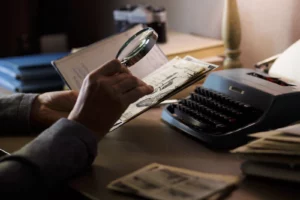Whenever you find yourself in a predicament where you need to dig a little deeper to find the truth or just to bring peace to your mind, hiring a private investigator might seem like the most logical step. Perhaps you’re looking for a long-lost relative, suspecting infidelity, or in need of due diligence for your business. Private investigators, with their specialized skills and access to information, might provide the solution you’re seeking. However, just like any other service, hiring a private investigator also comes with a set of risks that you should be aware of.

This article delves into the risks you may face when hiring a private investigator, aiming to give you a thorough understanding of what could potentially go wrong. While the portrayal of private investigators in movies and TV series might make their work seem thrilling and straightforward, the reality can be quite different. Understanding these risks can help you make an informed decision and prepare for potential setbacks.
From financial implications to emotional tolls, from legal and ethical constraints to the risks of dealing with unlicensed investigators, we’ll go over each aspect in detail, providing real-life examples and evidence where possible. This way, you’re not just armed with theoretical knowledge but also practical insights that can guide your actions.
Understanding the Legal and Ethical Constraints
When contemplating the decision to hire a private investigator, it’s crucial to understand the legal and ethical constraints these professionals operate under. Notably, investigators must adhere to a strict code of conduct, and any deviation could lead to legal trouble for both them and you, their client.
Potential breach of privacy
In their quest to uncover the truth, private investigators might end up encroaching on people’s privacy, which is a significant concern. They could cross boundaries that are clearly defined by law, like trespassing onto private property or resorting to illegal surveillance techniques. If they breach these laws, you, as the client, could potentially face legal repercussions.
It’s essential to understand that private investigators are not above the law. They can’t wiretap phones without consent, access protected databases unlawfully, or engage in harassment or stalking behavior. Hiring a private investigator doesn’t grant carte blanche access to all information; they must respect privacy laws and other legal boundaries.
Overstepping Legal Boundaries
Sometimes, the eagerness to gather evidence can lead private investigators to overstep legal limits. A classic example is impersonation, which may seem like an innocent ploy but is actually illegal in many jurisdictions. Other such instances can include:
- Breaking and entering
- Coercion or intimidation
- Misrepresentation or fraud
Remember that any evidence obtained through illegal means will be inadmissible in court. Moreover, these actions could potentially expose you to legal risk and even damage your reputation.
Risk of acquiring inaccurate or misleading information
Private investigators are only humans, and like all of us, they can make mistakes. There’s a risk that they might interpret information incorrectly, overlook crucial details, or be misled by false leads. Consequently, the information they provide may not always be accurate or reliable.
In the worst-case scenario, a private investigator may even resort to fabricating information to satisfy a client’s demands. While this is not a common practice among professional investigators, it is a risk that should be taken into account, especially when hiring someone without a proven track record.
In conclusion, it’s important to understand the legal and ethical boundaries within which a private investigator operates. To protect yourself from any potential risks:
- Always ensure that the private investigator you hire is licensed and reputable.
- Discuss the investigative methods they will employ.
- Make sure that they are well-versed in local and national laws related to investigation and surveillance.
Awareness of these issues can significantly mitigate the risks associated with hiring a private investigator, ensuring you get the information you need without any unexpected and unwanted consequences.
Financial Implications

Now, let’s delve into the financial side of hiring a private investigator. While we often think about the practical and legal aspects of such a decision, the monetary implications are equally significant and deserve careful consideration.
Costs Associated with Hiring a Private Investigator
Private investigators provide a specialized service, and their expertise comes at a price. Depending on the complexity of the case, the duration of the investigation, and the resources required, the cost of hiring a private investigator can range from a few hundred to several thousand dollars.
- Hourly Rates: Most investigators charge by the hour. The rates can vary based on the investigator’s experience, location, and the nature of the job. It’s important to understand these rates upfront to avoid any surprises down the line.
- Expenses: Beyond the hourly rate, investigators may also bill for additional expenses incurred during the investigation. These can include travel costs, database access fees, or any specialist equipment required for the job.
Before signing a contract with a private investigator, make sure you have a clear understanding of the potential costs involved.
Possibility of Hidden Fees
Sometimes, costs may arise that weren’t initially included in the estimate. These ‘hidden fees’ can include charges for extra manpower, unexpected travel, or special equipment that was not initially foreseen. These additional costs can quickly add up and stretch your budget.
Case Study
Consider the case of Jane Doe, who hired a private investigator to find her estranged brother. The initial estimate seemed reasonable, but as the investigation progressed, she received several bills for unexpected costs. The investigator needed to travel interstate, hire additional resources, and pay for special database access. All these charges were justified, but Jane was not prepared for them. In the end, she ended up paying almost double the initial estimate, which put a significant strain on her finances.
Here’s what you can do to protect yourself from unexpected financial surprises:
- Discuss potential costs in detail before beginning the investigation.
- Ask for an itemized breakdown of costs.
- Agree on how unexpected expenses will be handled.
- Ask for regular updates on costs as the investigation progresses.
The emotional toll

So far, we’ve discussed the legal and financial aspects of hiring a private investigator. However, one factor often overlooked is the emotional toll this process can take on an individual. Investigations, especially those of a personal nature, can bring a cascade of emotions to the surface.
anxiety
Hiring a private investigator means that you are delving into unknown territories, seeking answers that could dramatically alter your life. This journey of discovery can often be stressful and anxiety-inducing. It’s not uncommon to feel a sense of unease while waiting for updates, or when presented with information that’s difficult to process.
Moreover, there’s always the chance that the investigation might not yield the results you’re hoping for. The uncertainty and potential disappointment can contribute significantly to the emotional stress experienced during this process.
Unwanted Exposure and Potential Backlash
In certain situations, the fact that you’ve hired a private investigator might become known to others involved in the investigation. This can lead to feelings of embarrassment, guilt, or discomfort, especially if the investigation is of a sensitive or personal nature.
Further, there’s always the risk of backlash. For instance, if you’re investigating someone without their knowledge and they find out, it could lead to strained relationships or even legal consequences.
Amateur or unlicensed investigators

So far, we’ve been talking about private investigators as a homogenous group of professionals. However, not all investigators are created equal. The industry includes a spectrum of practitioners, from highly skilled and experienced professionals to amateur or unlicensed investigators. The latter group can pose significant risks.
How to Identify Unlicensed Investigators
While it may seem obvious that you should hire a licensed private investigator, it’s not always easy to distinguish between the professional and the amateur. Unlicensed investigators might promise lower fees or quicker results, but the risks involved are far greater. Here are some red flags that might indicate you’re dealing with an unlicensed investigator:
- Lack of Proof of Licensing: Every private investigator should be able to produce proof of their licensing. If they can’t or won’t, it’s a significant red flag.
- Unprofessional Behavior: This could include poor communication, lack of a contract, or reluctance to discuss their methods or planned approach to your case.
- Unrealistic Promises: If they promise results that seem too good to be true, they probably are. Professional investigators know that each case has its unique challenges and can’t guarantee specific outcomes.
The Potential Harm They Can Cause
Unlicensed or amateur investigators can cause a lot of harm. They might use illegal methods, deliver inaccurate information, or even disappear with your money without completing the task. Additionally, since they’re not regulated, seeking redress can be challenging.
Consider this: an unlicensed investigator might use illegal surveillance methods, which not only risks your legal standing but also compromises the admissibility of any evidence collected. Likewise, they might lack the necessary skills and experience to handle sensitive situations, resulting in emotional distress or damaged relationships.
Dependence on the Investigator

After addressing the legal, financial, and emotional aspects and the risks of hiring unlicensed investigators, let’s move on to another potential risk: becoming overly dependent on the investigator. This may not seem like a major concern initially, but it can become problematic, affecting both the investigation and your personal wellbeing.
Emotional Dependence
Due to the nature of their work, private investigators often become privy to very personal aspects of their clients’ lives. When dealing with sensitive matters, clients might start relying heavily on their investigator, treating them as a confidant or counselor. This dependency can blur professional boundaries and potentially cloud the investigator’s judgment.
Delayed Closure
Another issue with dependence is that it can delay closure. You might find yourself extending the investigation unnecessarily because you’ve become accustomed to the process or because you’re seeking reassurance. This not only prolongs your emotional stress but also adds to the financial burden of the investigation.
Risk of manipulation
Dependence can also create a power imbalance that could potentially be exploited. An unscrupulous investigator might take advantage of a client’s dependence to inflate costs, prolong the investigation, or manipulate the outcomes.
Let’s consider a hypothetical scenario: Sara hired a private investigator to find out if her business partner was engaging in fraudulent activity. As the investigation progressed, Sara became increasingly reliant on the investigator, who started manipulating the situation to his advantage. He prolonged the investigation unnecessarily, leading to higher fees, and provided misleading information that served his interests.
To avoid such scenarios, here are some precautions you can take:
- Maintain professional boundaries. Your relationship with your investigator should remain strictly professional.
- Regularly reassess the progress and necessity of the investigation.
- Consider seeking support from other sources, such as counselors or support groups, to manage emotional stress.
- If you feel you’re becoming overly dependent on your investigator, discuss your concerns with them or consider finding a new investigator.
Final Thoughts

Hiring a private investigator can be a valuable decision when you find yourself in a situation that calls for expert skills in surveillance, background checks, or uncovering hidden truths. However, as with any important decision, it’s crucial to understand the potential risks associated with it, which include legal, financial, and emotional aspects, as well as the possibility of dependence on the investigator.
Here is a quick recap of what we’ve covered:
- Legal and Ethical Constraints: Ensure your private investigator operates within the law and holds strong ethical principles.
- Financial Implications: Be prepared for potential costs, including the investigator’s fee and possible incidental costs.
- Emotional Toll: Recognize the emotional impact that the process might have on you and others involved.
- Amateur or Unlicensed Investigators: Make certain to hire a licensed professional and avoid unqualified or unlicensed investigators.
- Risk of Dependence: Strive to maintain a professional relationship with your investigator to avoid over-reliance.
Private investigators, like any other professionals, are a diverse group, with varied skills, experience levels, and ethical standards. The key to a positive experience is careful selection and management of the professional you choose to hire.
A skilled, reputable private investigator can be a tremendous asset, helping you navigate complex situations and providing critical information when you need it most. By being aware of potential risks and taking proactive steps to manage them, you can significantly increase your chances of a satisfactory outcome.
Every case is unique, and not all risks will apply in every situation. Nevertheless, awareness of these potential risks is the first step towards mitigating them and ensuring a successful investigative process.

